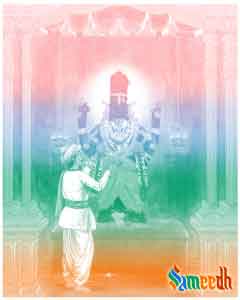Pundalik is a central figure in the story of Lord Vithoba (Panduranga) and is considered a great devotee of the deity. His story is deeply intertwined with the worship and pilgrimage to Pandharpur, where the temple of Lord Vithoba is located. Here is a brief account of Pundalik’s life and his devotion to Lord Vithoba.

The Legend of Pundalik
Pundalik was born to a Brahmin couple, Janudev and Satyavati, in a village called Pandharpur. Initially, Pundalik was a disobedient and troublesome son who treated his parents poorly. He often neglected them and caused them much distress. However, a transformative event led to his eventual enlightenment and deep devotion.
Transformation
One version of the story suggests that Pundalik’s transformation began when he went on a pilgrimage to Kashi (Varanasi). During the journey, he encountered the ashram of the sage Kukkut Rishi. At the ashram, he witnessed the devotion and care with which the sage and his disciples served their parents. This sight deeply moved Pundalik and made him realize his own shortcomings.
Feeling ashamed and remorseful for his past behavior, Pundalik returned home with a renewed sense of duty and devotion towards his parents. He began to serve them with great care and love, placing their needs above his own. His dedication and transformation caught the attention of the divine.
Encounter with Lord Vithoba
According to the legend, pleased with Pundalik’s devotion, Lord Krushna decided to visit him in the form of Vithoba. One day, as Pundalik was busy attending to his parents, Lord Vithoba appeared at his door. Pundalik, fully engrossed in serving his parents, asked the Lord to wait and threw a brick (called “Vit” in Marathi) outside for Him to stand on.
The Lord stood on the brick and waited patiently for Pundalik to finish his duties. After completing his service to his parents, Pundalik came out and apologized to the Lord for making Him wait. Impressed by Pundalik’s unwavering devotion to his parents, Lord Vithoba blessed him and granted him a boon. Pundalik requested the Lord to remain in Pandharpur and bless all His devotees. The Lord agreed and thus stayed in Pandharpur, standing on the brick, which is how He is depicted in the famous Vithoba temple.
Significance
The story of Pundalik emphasizes the importance of “Matru Devo Bhava, Pitru Devo Bhava” (reverence for mother and father as gods) in Hindu culture. Pundalik’s transformation from a wayward son to a devoted caretaker of his parents exemplifies the virtues of repentance, devotion, and selfless service.
Pundalik and Pandharpur Pilgrimage
Pundalik is honored as a key figure in the Pandharpur pilgrimage. Devotees believe that serving one’s parents and seeking their blessings is an essential step towards spiritual progress. Pundalik’s story is recited and remembered by those who visit the Vithoba temple, and his life serves as an inspiration for leading a life of devotion and righteousness.
While Pundalik might not be explicitly mentioned in the verses of the Pandurangashtakam, his story and legacy are deeply embedded in the spiritual fabric of Pandharpur and the devotion towards Lord Panduranga. The hymn, in essence, is a homage to the divine presence that Pundalik’s devotion summoned and established in Pandharpur, making it a pivotal pilgrimage site. Through the Pandurangashtakam, devotees indirectly honor Pundalik’s devotion by venerating the deity who responded to his unparalleled Bhakti.
In summary, Pundalik’s story is a powerful tale of redemption, devotion, and divine grace, illustrating the profound impact of selfless service and the blessings it can bring.
